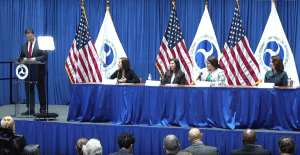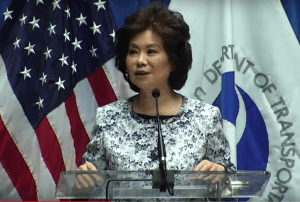Dr. Cecilia Feeley’s research addresses transportation and mobility issues for individuals on the Autism spectrum. Last month, she shared her knowledge and work with other mobility experts at the nation’s capital.

The USDOT’s 2019 Access and Mobility for All Summit identified priority Federal and non-Federal activities that can provide more accessible vehicles and mobility services such as autonomous vehicles, transit, and ridesharing. Photo ©USDOT.
On Tuesday, October 29, 2019, the United States Department of Transportation (USDOT) hosted the Access and Mobility for All Summit, and the Rutgers Center for Advanced Infrastructure and Transportation (CAIT) was in attendance.
Designed to help raise awareness of DOT and government-wide efforts to improve access and mobility for people with disabilities, older adults, and individuals of low income, the summit brought together a host of leaders in the transportation field.
U.S. Secretary of Transportation Elaine L. Chao set the theme of the day with her opening remarks.
“This is a great day, and a big step forward in providing equal access to mobility for all Americans, especially for older adults, people with disabilities, and low-income communities,” she said.
She also discussed her experience as U.S. Secretary of Labor, where she directed the Bureau of Labor Statistics to collect employment data on persons with disabilities, as part of the monthly Current Population Survey. This helped the Labor Department gain a better understanding of the labor-market experience of people with disabilities. Secretary Chao said this also helped departments understand how to better serve people with disabilities who want to fully participate in the workforce.
“Today, we have another opportunity to make a difference for this and other traditionally underserved communities,” she concluded.
Specifically, the summit identified priority Federal and non-Federal activities and innovations that can provide more efficient, affordable, and accessible vehicles and mobility services such as transit and ridesharing.

USDOT Secretary of Transportation Elaine L. Chao discussed new funding and the importance of providing equal access to mobility for all people. Photo ©USDOT.
Dr. Cecilia Feeley, Transportation Autism Project Manager at CAIT, was among the researchers personally invited to attend the summit. She was chosen by USDOT to participate in the breakout group that focused on “opportunities, challenges, and priorities related to innovations in vehicle technologies that can expand accessible mobility options.” This group primary focused on the emerging autonomous vehicle market.
Commenting on the breakout session, Dr. Feeley said she was able to share some recent CAIT research findings on autonomous vehicles and the needs of persons with Autism and related developmental disabilities.
“We found it is important that the technology is understood by both the autistic individuals and their families to ensure support while reducing anxiety,” she said. “It will also be critical that there are multiple ways to communicate a rider’s wants and needs–spoken, typed, or pre-loaded with the rider’s reservation info.”
Dr. Feeley also said it is important that the USDOT is already working to address these needs.
“While there are solutions that still need to be developed to ensure that self-driving technology will be accessible for all, it is assuring that USDOT is not only listening but actively seeking input,” she said. “They brought a number of different players to the table–OEMs, technology companies, researchers, and advocacy organizations. This will ensure that upcoming transportation options are accessible by design for all users including those with a wide range of needs.”
The summit was split up into two sessions, the first on “Access and Mobility for All,” and the latter on “The Future of Mobility Services.”
During the summit, Secretary Chao also announced nearly $50 Million in funding designed to identify ways to provide more accessible transportation services to people with disabilities and other underserved communities.
This funding includes:
- A planned Complete Trip Deployment solicitation, which will make up to $40 million available to enable communities to showcase innovative business partnerships, technologies, and practices that promote independent mobility for all.
- A planned Inclusive Design Challenge, which will make up to $5 million in cash prizes available to innovators who design solutions to enable accessible automated vehicles.
- A Notice of Funding Opportunity for FTA’s FY 2020 Mobility for All Pilot Program.
- And a strategic plan for the Coordinating Council on Access and Mobility (CCAM), an interagency partnership to coordinate the efforts of federal agencies funding transportation services for targeted populations.
Dr. Feeley said that this funding and the topics addressed during the summit will help direct efforts for improving access and mobility for people with disabilities going forward. Some of her current research also addresses these pressing challenges.
For example, she is examining the impact that pedestrian infrastructure has on people with Autism through using Virtual Reality (VR) technology. She is also studying barriers to using autonomous vehicles that people with disabilities may face, as well as positive or negative impacts that self-driving cars might have on them.
“This is an exciting time to be in the transportation field,” Dr. Feeley said. “Many people were not prepared for the disruption from ride-hailing and shared-mobility services. We can see our travel and mobility patterns will be disrupted again and even more dramatically by autonomous vehicles, but we still have the time and ability to influence what the vehicles and interface can look like to make sure they are inclusive.”

